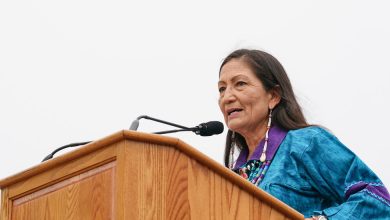A Climate Warrior’s Journey From Summit Talks to Street Protests

It took 20 minutes for police officers to unglue Farhana Yamin from Shell’s offices in London.
It was April 2019 and Ms. Yamin was one of many protesters from the global environmental movement Extinction Rebellion occupying the streets of central London and calling on the British authorities to take climate action. But unlike other protesters, some of whom had always been anti-establishment, Ms. Yamin had spent most of her life not only believing in the system but working at its top levels.
“My life and my work is a dance between an insider and an outsider,” she said.
Her experience as an insider goes back more than 30 years. Ms. Yamin, 57, is an internationally recognized environmental lawyer and a respected adviser to developing countries and small island nations like the Marshall Islands, working on their behalf at the international level.
She is also a leading author for the Intergovernmental Panel on Climate Change and was a key architect of the Paris climate agreement. Ms. Yamin is widely seen as responsible for securing, through behind-the-scenes diplomacy, a central element of the pact: The goal of net-zero emissions by midcentury.
After the agreement, though, as Donald J. Trump rose to power in the United States and other countries continually delayed strong action on climate change, she said her faith in institutions began to crumble.
“I was naïve about what we could achieve,” Ms. Yasmin said of her intellectual journey. “I’ve learned we cannot rely on lawyers and diplomats alone.”
That journey started when Ms. Yamin was studying law in her 20s. Growing up as a Pakistani immigrant in England who experienced racism, Ms. Yamin knew she wanted to spend her career fighting injustice. When she embarked on an internship with a small environmental law firm in 1991 as a recent Oxford graduate, Ms. Yamin knew she had found her calling. “I never looked back,” she said. “I was optimistic.”
Since then, Ms. Yamin has attended nearly every major international climate conference, but she is best known for her work at the negotiations that led to the Paris Agreement.
She had spent years working with academics, civil society groups and lawyers to make net-zero emissions — the idea of using reductions, carbon capture and carbon offsets to ensure that no additional greenhouse gases are added to the atmosphere — the rallying call of the 2015 conference. “Farhana was among a handful of collaborators who was willing to step up and champion this quest,” said Bernice Lee, a research director on sustainability at Chatham House, a London research organization.
But just months after Ms. Yamin achieved one of the biggest victories of her career, she said, things took a turn for the worse. By 2016, some Western countries were seeing a rise of nationalism and a growing distrust of international institutions, with Britain voting to leave the European Union and Donald J. Trump threatening to pull the United States out of the Paris Agreement if elected.
“I felt that the whole multilateral world, the international framework for human rights, was just collapsing around me,” Ms. Yamin said.
When, from a meeting room at a United Nations climate conference in Marrakesh, Morocco, Ms. Yamin watched Mr. Trump win the election, she was despondent. She felt that her 30-year career as a government lawyer and climate negotiator had amounted to nothing.
“All of it was going up in smoke,” she said. “I couldn’t tell my clients, I couldn’t lie to the Marshall Islands, that we would fix this.” Ms. Yamin took a year off, spending most of her time in nature therapy classes and camping in the wilderness for weeks at a time.
During her time off, Ms. Yamin began reading about other social movements, like the anti-apartheid campaign and the suffragist movement, that used social mobilization and nonviolent resistance to advance their causes. “I felt that the climate movement was almost unique and fragile, relying mostly on insider tactics and not on movement building,” she said. “It wasn’t relying on the full sets of tools.”
It was this idea that reignited Ms. Yamin’s passion for climate and helped her get back to work. Instead of returning to climate diplomacy, Ms. Yamin joined the nascent Extinction Rebellion movement, a decentralized group that uses nonviolent action and civil disobedience, in 2018.
Initially, Ms. Yamin became the leader of Extinction Rebellion’s political team, using her knowledge of the diplomatic terrain to help the movement be more strategic in its activism and get more funding. Even in her new activist role, though, Ms. Yamin felt she was relying too heavily on her intellectual skills instead of putting her body on the line. When an Intergovernmental Panel on Climate Change report was issued in October 2018, Ms. Yamin was reading the report as activists filled Parliament Square in London. As she saw pictures of young people refusing to move and waiting to be arrested, she thought, “I want to be with them.”
Understand the Latest News on Climate Change
Ice shelf collapses. For the first time since satellites began observing Antarctica nearly half a century ago, an ice shelf has collapsed on the eastern part of the continent. The 450-square-mile ice shelf was located in an area known as Wilkes Land; the loss occurred in mid-March.
A massive leak. Startlingly large amounts of methane are leaking from wells and pipelines in New Mexico’s Permian Basin, according to a new analysis of aerial data, suggesting that the oil and gas industry may be contributing more to climate change than was previously known.
Australia’s Great Barrier Reef. A wide stretch of the Great Barrier Reef has been hit by a sixth mass bleaching event, an alarming indicator that the area is under intense stress from the waters around them, which have been growing steadily warmer as a result of climate change..
Enduring drought. Drought conditions are likely to continue across more than half of the continental United States through at least June, the National Oceanic and Atmospheric Administration said. Nearly 60 percent of the continental United States is experiencing drought.
Ms. Yamin spent the following two years working with Extinction Rebellion, organizing and protesting alongside other activists. She stepped down from her role with the group in 2020 because of disagreements with other leaders. Ms. Yamin said she believed the movement was not focused enough on climate justice.
Since then, Ms. Yamin has been charting a new path, one that does not depend on institutions or activist groups.
At COP26, the latest United Nations climate summit, held last year in Glasgow, Ms. Yamin worked as hard as she always has at these events, eager to defend the legacy of Paris. But rather than spend her days in the negotiating room, surrounded by what she calls a “toxic positivity,” Ms. Yamin focused on movement-building and listening to vulnerable people who spoke outside the conference center.
She said she left Glasgow heartbroken, both by the outcome of the conference and the stories she heard from marginalized communities about climate impacts. “I could almost cry. We keep pushing the deadlines out,” she said. “At what point do we say, ‘Enough?’”
For her next chapter, Ms. Yamin said she wants to work directly with frontline communities of color in Britain and help to mobilize the cultural sector to become more engaged in climate issues.
“We need the cultural sector and the creatives to help us imagine our way out of the crisis,” she said. She also wants to educate philanthropic organizations on climate justice to help get more money to frontline communities. Her goal is to make sure every pocket of society is fighting the climate crisis. “Everyone should have ‘activist’ on their C.V.,” she said.
When asked how she feels looking back at her career, Ms. Yamin paused. “I’m proud of my achievements,” she said. “But I can’t keep carrying on doing that in the face of known indifference.”
She added, “I’m much more honest now.”



